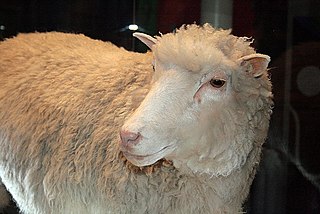
Dolly was a female Finn-Dorset sheep and the first mammal that was cloned from an adult somatic cell. She was cloned by associates of the Roslin Institute in Scotland, using the process of nuclear transfer from a cell taken from a mammary gland. Her cloning proved that a cloned organism could be produced from a mature cell from a specific body part. Contrary to popular belief, she was not the first animal to be cloned.
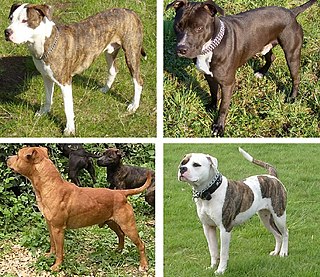
Pit bull is an umbrella term for several types of dog believed to have descended from bull and terriers. In the United States, the term is usually considered to include the American Pit Bull Terrier, American Staffordshire Terrier, American Bully, Staffordshire Bull Terrier, and sometimes the American Bulldog, along with any crossbred dog that shares certain physical characteristics with these breeds. In other countries, including the United Kingdom, the term is used as an abbreviation of the American Pit Bull Terrier breed specifically, while the Staffordshire Bull Terrier is not considered a pit bull. Most pit bull–type dogs descend from the British bull and terrier, a 19th-century dog-fighting type developed from crosses between the Old English Bulldog and the Old English Terrier.
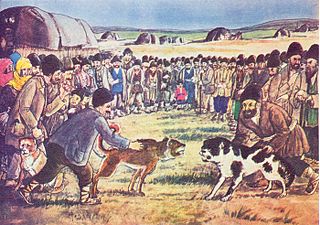
Dog fighting is a type of blood sport that turns game and fighting dogs against each other in a physical fight, often to the death, for the purposes of gambling or entertainment to the spectators. In rural areas, fights are often staged in barns or outdoor pits; in urban areas, fights are often staged in garages, basements, warehouses, alleyways, abandoned buildings, neighborhood playgrounds, or in the streets. Dog fights usually last until one dog is declared a winner, which occurs when one dog fails to scratch, dies, or jumps out of the pit. Sometimes dog fights end without declaring a winner; for instance, the dog's owner may call the fight.
The Texas A&M University School of Veterinary Medicine & Biomedical Sciences is the veterinary school of Texas A&M University, a public research university in College Station, Texas. It was founded in 1916 and is one of only 31 colleges or schools of veterinary medicine in the United States and Canada. It is consistently ranked as one of the top 5 veterinary schools in the country, according to U.S. News. The school offers an undergraduate program in Biomedical Sciences, a professional Doctor of Veterinary Medicine program, and numerous graduate programs relating to veterinary medicine and epidemiology.

The Bull Terrier is a breed of dog in the terrier family. There is also a miniature version of this breed which is officially known as the Miniature Bull Terrier. This breed originates in 19th century England. Bull Terriers are most recognised by their unique head features. The Bull Terrier was originally bred for vermin control and bloodsports.

Alexander Zickler is a German professional football coach and a former player who played as a striker. He is the assistant manager of Marco Rose at RB Leipzig.

David Villa Sánchez is a Spanish former professional footballer who played as a striker. Regarded as one of the best strikers of his generation, Villa is the all-time top goalscorer of the Spain national team. He is currently the vice-president of Spanish Tercera Federación club CF Benidorm.

Royal Canin is a French manufacturer and global supplier of cat and dog food. The company is a subsidiary of Mars, Incorporated. It undertakes research into the specific nutritional needs of dogs and cats.

Miodrag Stojković is a Serbian researcher in genetics with the Institute of Human Genetics at Newcastle University. He holds a PhD from the Ludwig-Maximilians University in Munich. As of January 2006, he is serving as a deputy director and head of Cellular Reprogramming Laboratory, Centro de Investigación Príncipe Felipe, Valencia, Spain.

The Spanish Fighting Bull is an Iberian heterogeneous cattle population. It is exclusively bred free-range on extensive estates in Spain, Portugal, France and Latin American countries where bullfighting is organized. Fighting bulls are selected primarily for a certain combination of aggression, energy, strength and stamina. In order to preserve their natural traits, during breeding the bulls rarely encounter humans, and if so, never encounter them on foot.

Alfonso Enrique Ponce Martínez, also known as Enrique Ponce, is a Spanish bullfighter.

CEU Cardenal Herrera University is a private university located in the Valencian Community, Spain. It is part of the CEU Foundation, being the first private school of Law ever founded in Valencia. It has been associated to the University of Valencia and Polytechnic University of Valencia since the early 1970s but the university gained its current name in 1999.
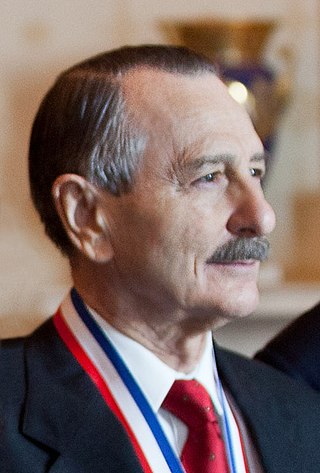
Ralph Lawrence Brinster is an American geneticist, National Medal of Science laureate, and Richard King Mellon Professor of Reproductive Physiology at the School of Veterinary Medicine, University of Pennsylvania.

Trakr was a German Shepherd police dog who along with his handler, Canadian police officer James Symington, discovered the last survivor of the September 11 attacks at the World Trade Center in New York City in 2001. For his accomplishments, Trakr was named one of history's most heroic animals by Time magazine. In 2008 Symington won an essay contest sponsored by BioArts International to find the world's most "cloneworthy dog," as a result of which Trakr was cloned, producing five puppies.
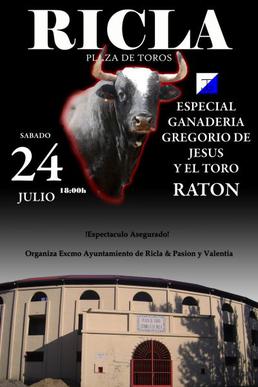
Ratón was a Spanish fighting bull that was nicknamed el toro asesino, el sangriento toro Raton and el terrible Ratón for killing three people in bullfighting rings in Spain during 2006–2011 and injuring thirty more. The bull became legendary in Spain due to the large number of gorings for which he was responsible. Bullfighting fans regarded him as a star and traveled from across the country to see the morlaco at his home at Sueca near Valencia. Matador Jesús Esteve said of Ratón: "He is a killer. He is lazy, he doesn't want to participate. He does his own thing, waiting for somebody to make a mistake. And then when he gets you, he wallops you, and he doesn't let up."

Peter Lim Eng Hock is a Singaporean business magnate who was a stockbroker and an investor in palm oil, and is now a private investor focused on healthcare, property, sports, and education. In 2023, he was ranked 23rd on Forbes' list of Singapore's 50 Richest with a net worth of US$1.9 billion. He is a shareholder of English club Salford City and the owner of Spanish La Liga club Valencia CF since 2014.
Garcia Cugat Foundation for Biomedical Research is a Spanish private non-profit organization dedicated to research in biological treatments constituted in 2007 by a group of physicians, veterinarians, and health professionals, although early research by some members began in 2002.

A bucking bull is a bull used in rodeo bull riding competition. They are usually a Brahman crossed with another breed, weighing 1,500 pounds or more, selected for their tendency to "leap, plunge and spin" when a human is on its back. Circa mid-20th century breeders began selecting bulls for bad temperament, that would buck when ridden. Many of the best bucking bulls trace their lineage to bulls owned by Charlie Plummer of Oklahoma. These are known as Plummer bulls.















